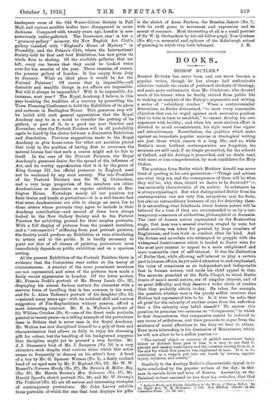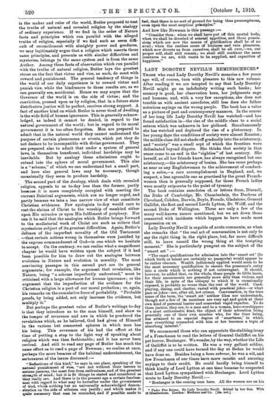BOOKS.
BISHOP BUTLER.* BISHOP BUTLER has never been, and can never become, a popular writer, though he has always had enthusiastic admirers outside the ranks of professed students of theology, and none more enthusiastic than 1Tr. Gladstone, who devoted much of his leisure when he finally retired from public life to making an analysis of the Bishop's arguments and writing a series of " subsidiary studies." When a controversialist determines, as Butler determined, "to meet every reasonable objection that can be urged against each successive position that he tries in turn to establish," he cannot develop his own argument with lucidity ; and when his most anxious effort is directed to avoid overstatement, his style must lose vigour and attractiveness. Nevertheless, the qualities which make against an immediate popular success in theological writing are just those which ensure it a long life; and so, while Butler's more brilliant contemporaries are forgotten, his sermons are still read, if no longer prescribed, for Om schools
at Oxford, and his Analogy is prescribed, and no doubt read, with more or less comprehension, by most candidates for Holy
Orders.
The sentence from Butler which Matthew Arnold was never tired of quoting to his own generation—" Things and actions
are what they are, and the consequences of them will be what they will be; why, then, should we desire to be deceived? "- was eminently characteristic of its author. In substance he
is always repeating it. But what distinguished Butler from his contemporaries was not only this scrupulous care for facts,
but also an extraordinary keenness of eye for detecting them. It is astonishing what falsehoods about human nature will be believed for a time if they are recommended' to us by a con- temporary consensus of authorities, philosophical or dramatic.
The view of human nature represented on the Restoration stage, that man was a sensual creature, swayed by none but selfish motives, was taken for granted by large numbers of Englishmen, and bore fruit in conduct after its kind. And the divines and moralists who attempted to grapple with the widespread licentiousness which it tended to foster were for the most part content to appeal to a more enlightened and more reasonable view of self-interest. It was the distinction of Butler that, while allowing self-interest to play a certain part in human affairs, he yet called attention to, and emphasised, the voice of conscience as an independent and indisputable
fact in human nature, and made his chief appeal to that. The sermons preached at the Rolls Chapel, in which Butler treats of man's moral nature, are of singular interest, and of no great difficulty, and they deserve a wider circle of readers than they probably obtain to-day. He takes, for example, the question whether man is the purely selfish creature that Hobbes had represented him to be. Is it true, he asks," that all grief for the calamity of another arises from the reflection that a like calamity may befall oneself ? To answer this question he preaches two sermons on " Compassion," in -whieh he first demonstrates that compassion cannot' be reduced to any terms of selfishness, and then proceeds to argue from the
existence'of social affections to the duty we bear to others. Even more interesting is his discussion of Resentment, which he will not allow to be a selfish passion :—
"The natural object or occasion of settled resentment being injury as distinot from pain or lose, it is easy to see that to prevent and remedy such injury and the miseries arising from it; is the end for which this passion was implanted in man. Wiz to be considered as a weapon put into. our hands by nature, against injury, injustice, and cruelty."
Similarly in the _Analogy Butler's characteristic appesil its to facts overlooked by the popular writers of the day; is tins case, to certain facts and laws of Nature. Assuming, as -the Deistical writers assumed no less than the crthddox,that GOd • Butler!, Works, and Studies' Subsidiary to the Works of Bishop Bitter. 'By the Right Hon. W. V. Gladstone. 3 ride. brew Bit:Mos. (Word: Sit-41se Clirendon Press.' Cis. ed.-nett
is the maker and ruler of the world, Butler proposed to test the truths of natural and revealed religion by the analogy of ordinary experience. If we find in the order of Nature facts and principles which run parallel with the alleged truths of religion, especially if we find such as seem diffi- cult of reconcilement with almighty power and goodness, we may legitimately argue that a religion which asserts these same principles, and presents us with similar difficulties and mysteries, belongs to the same system and is from the same Author. Among these facts of observation which run parallel with the truths of natural religion, Butler lays the greatest stress on the fact that virtue and vice, as such, do meet with reward and punishment. The general tendency of things in the world of our daily experience is to reward virtue and
punish vice, while the hindrances to these results are, as we can generally see, accidental. Hence we may argue that the Governor of the world, is on the side of virtue ; and the
conviction, pressed upon us by religion, that in a future state distributive justice will be perfect, receives strong support. A fact of another kind on which Butler is never tired of dwelling is the wide field of human ignorance. This is generally acknow- ledged, as indeed it cannot be denied, in regard to the natural government of the world; but in regard to its moral government it is too often forgotten. Men are prepared to admit that in the natural world they cannot understand the purpose of certain phenomena or events, whioh yet they do not declare to be incompatible with divine government. They are prepared also to admit that under a system of general laws, in themselves beneficent, individual hardships may be inevitable. But by analogy these admissions ought to extend into the sphere of moral government. This also is a "scheme," of whieh we can understand but a small part, and here also general laws may be necessary, though occasionally they seem to produce hardship.
The seoond part of the Analogy, which deals with revealed religion, appeals to us to-day less than the former, partly bemuse it is more completely occupied with meeting the current Deistical arguments, which are no longer urged, and partly because we take a less narrow view of what constitute Christian evidenees. Few apologists to-day would care to rest the claims of Christ to the worship of mankind either upon His miracles or upon His fulfilment of prophecy. Nor can it be said that the analogies which Butler brings forward to the mediatorial work of Christ are such as relieve that mysterious subject of its greatest difficulties. Again, Butler's defence of the imperfect morality of the Old Testament
—that, certain actions wrong in themselves were justified by the express commandment of God—is one which we hesitate to accept. On the contrary, we can realise what a magnificent chapter he would have written upon the subject if it had
been possible for him to draw out the analogies between evolution in Nature and evolution in morality. The most eoravinoing passages in this second part are its general arguments ; for example, the argument that revelation, like Nature, being " a scheme imperfectly understood," must be criticised with a large allowance for human ignorance ; or the argument that the imperfection of the evidence for the Christian religion is a part of our moral probation; or, again, his remarks on the cumulative force of probability. "Probable proofs, by being added, not only increase the evidence, but multiply it."
But perhaps the greatest value of Butler's writings to-day is that they introduce us to the man himself, and show us the temper of reverence and awe in which be pondered the revelations which, as he believed, God had given of Himself in the various bat connected spheres in which man has his being. This reverenoe of his had the effect at the
time of putting a stop to the light way of speaking about religion which was then fashionable; and it has never been
revived. And still to read any page of Butler has much the same effect as to read a page of Newman ; we realise at once, perhaps the more because of the habitual understatement, the seriousness of the issues discussed :—
/Lefieetions of this kind," he says in one place, speaking of the natural punishment of vies, "are not without their terrors to serious persons, the most free from enthusiasm, and of the greatest strength of mind; but it is fit things be stated and considered as they really are. And there is in the present age a certain fearless- ness with regard to what may be hereafter under the government of God, which nothing but an universally acknowledged demon- • stration on the side of atheism can justify ; and which makes it quite necessary that men be reminded, and if possible made to
feel, that there is no sort of ground for being thus presumptuous, even upon the most sceptical principles."
And how like Newman is this passage
" Consider then: when we shall have put off this mortal body, when we shall be divested of sensual appetites, and those posses- sions which are now the means of gratification shall be of no avail ; when the restless scene of business and vain pleasures, which now diverts us from ourselves, shall be all over,—we, our proper self, shall still remain; we shall still continue the same creatures we are, with wants to be supplied) and capacities of happiness."



























































 Previous page
Previous page